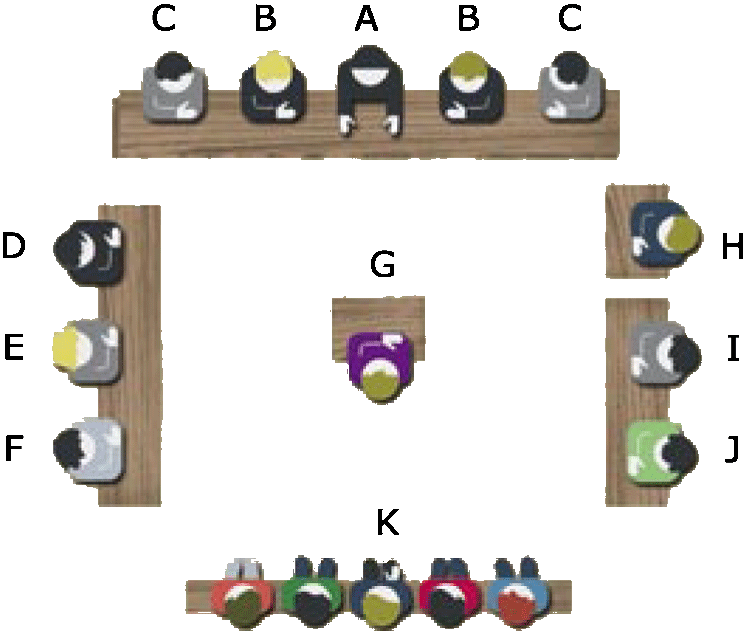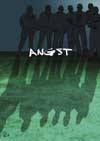What to do after a right-wing attack?
– At the train station, at a kiosk, at school, in youth clubs, on the bus. They call themselves nationalists, patriots, alt-right, or even just call themselves superior. They taunt, shove, and hit. They justify their actions with your appearance, your behaviour, or your political viewpoints.
You don't fit into their right-wing worldview because you have a different ethnic origin and different skin colour, because your thinking tends toward the left, or because you are a skater, punk or anything else that isn't "German" enough for them. So they attack you. They want to dominate and attempt to impose their values, clothing brands, and style – through intimidation, but also through violence.
Many who are not right-wing know all about this. And it isn't always easy to find support and be taken seriously. Prejudices and right-wing attitudes are unfortunately not merely fringe elements in society.
Right-wing extremists aren't just targeting you in isolation: individuals are attacked symbolically. The intended victim is your subculture or your clique. Don't deal with this stress on your own. And support others who are harassed by right-wing extremists. If nobody defends themselves, they will only be emboldened!
What can you do, and what should you be aware of if you or your friends are insulted or attacked by right-wing extremists?
On this webpage you can find pointers and tips:
- What is important after an attack
- Pros and cons of filing a police report
- What happens during a court proceeding?
- How will all of this affect you financially?
- How you can cope with fear
- What you should keep in mind when interacting with the press
You won't find any information here about many other topics that are just as important and that you are perhaps concerned about. For example, how to cope with meeting right-wing extremists every day at school; how you can expel Nazis from your youth club; what you can do if your parents tell you that it's all your fault that you face violence, "the way you're always running around".
We are advice centres for victims of right-wing violence. We can help you handle these problems or connect you with other advice centres. At the bottom of this page, you will find the addresses of a few organisations that can support you.
We have offices in almost every part of Germany. If you have been attacked by right-wing extremists or racists, you can receive support from us. This is our offer to you. This means that you determine what steps you would like to take with us!
Our advice costs you nothing. Everything that you talk about with us is kept strictly confidential. If you do not want any other persons or government agencies to know that you have been in touch with us, then this will not happen. Our guiding principle is that we always stand by those who are attacked by right-wing extremists.
If you want, we will talk with you about what legal options you have, and we accompany you as you work with government agencies and the courts. We help you to receive compensation for pain and suffering. You can also talk with us about what can be done to cope with fear, and how one can defend themselves against right-wing taunts, insults and attacks. No matter what problems you have after an attack: Give us a call or write an email!
You can find the contact data for the advice centre in your area by following the links on the various webpages on this site.
Have you been attacked by right wing extremists or racists? You should first think about who can best support you. Has anyone else been affected, or have you heard of an incident? Then you should think about how this person can be helped. Sometimes you first have to find out who was attacked. If you know this information, then you should first visit the affected person so that you can talk about what will help the person most and what you would like to do. Above all, it is important to not be alone. It is also important to not simply accept the attack and move on without properly dealing with it!
If you are injured, you should see a physician. Have the physician prepare a report that lists all injuries. Often, not all injuries are discovered right after an attack or they aren't felt yet. Some people also tend to play down what has happened to them. For any later court proceedings and to receive compensation for pain and suffering, you should document all injuries. You can take pictures of any visible injuries.
Are you unable to stop thinking about the attack? If you always have certain images flashing through your mind, or you are overcome by sudden anxiety: it is better to talk about it with someone. There are additional advice centres for this very purpose.
You might think that you will never forget these memories. Gaps will eventually creep into your memory over time. It is useful to write down what happened in order to prepare for the victim questioning that will probably take place. For this you should write down the entire situation and what happened, with as many details as possible. What hand was used to hit you? What foot hit you, what words were used to insult you, and what clothes or noticeable features did the attackers have?
Think about whether you would like to make a criminal complaint. If the police already know about the attack, then they will probably investigate it themselves. If not, then with a police report you can cause the right-wing extremists to be investigated. The police will question you in great detail about the incident. This conversation will be easier for you if you have thought in advance about what happened.
 POLICE
POLICE
After a criminal complaint is filed, the police are required to investigate. In some cases, this can lead to criminal court proceedings. If the perpetrators cannot be identified, the investigation will unfortunately be stopped. The attackers will be indicted (accused) for what they have done to you, and in the best case they will be convicted. Without a police report, it is possible that nobody will know about the incident, and as a result the right-wing extremists will not face any consequences. An attack by right-wing extremists is often a situation in which you don't have any control over what happens. A criminal complaint can be a first step toward gaining control back and being proactive.
Many right-wing extremists count on nobody reporting them to the police. This means they can simply continue doing the same thing. With a criminal complaint, you make it clear to them that you will not be intimidated. This can compel them to treat you with respect!
If you report a violent act by right-wing extremists, the attack is included in statistics and can be made into a public issue – for example by our advice centres. If right-wing attacks are reported, nobody can claim: Such things don't happen in our city...
Maybe you're hesitating because you are afraid of retaliation from right-wing extremists? It is correct and proper that the accused person learns who has made the accusation against them. This is uncomfortable. On the other hand, a criminal complaint has a deterrent effect on right-wing extremists. It is clear to most people accused of a crime that any attempt to intimidate you or other witnesses would negatively influence the ongoing criminal proceeding. Victim and witness intimidation is taken very seriously by the police and prosecutors.
If you are unsure, we can discuss with you the pros and cons of making a criminal complaint in your specific case.
If you are the victim of a right-wing attack and you want the perpetrators to be brought to justice, then you should make a criminal complaint. This is done by reporting the incident to the police station or the state prosecutor. It is best to make the criminal complaint as soon as possible after the incident. This increases the chances that the perpetrators will be investigated by the police. If you only decide to make the complaint at a later time, this is not always still possible. With the criminal complaint, you should also lodge a demand for criminal prosecution. Some types of crimes are only pursued if you as the victim declare that this is your wish with a demand for criminal prosecution. This is however only possible within three months of the incident.
As the victim, you are the most important witness. Often you will be questioned regarding the incident right after you report it. The police want to know exactly what happened. Writing down what happened will help you with this process.
Obtain a confirmation of your criminal complaint and your demand for criminal prosecution. The police is required to provide this to you. On the confirmation you will find a reference number [Tagebuchnummer]. You need this if you want to inquire about the status of the proceeding at a later time. If you are under the age of 18, then the demand for criminal prosecution must be lodged by your father, mother, or your legal representative.
If you do not know exactly who the attacker was, then describe them to the best of your memory. If you can't remember many details about the person, let the police know this – this is not a problem.
We can also accompany you to the police station.
Besides physical violence, there are other actions and symbols that can be criminally prosecuted according to the German Criminal Code (Strafgesetzbuch, abbreviated StGB). Often, right-wing extremists simultaneously commit multiple crimes that you can report to the police.
Insults and threats are criminally punishable. If violence or threats were used to force you to do something (or cause something to happen), this is called coercion. This is also criminally punishable.
The wearing, carrying or distribution of right-wing symbols, songs and slogans that have been declared unconstitutional is prohibited. Examples of these include the swastika, SS runic insignia, the Celtic cross, old Nazi slogans ("Heil Hitler"), and the Hitler salute. This also includes the symbols of neo-Nazi groups that have been banned, such as Blood and Honour.
When right-wing extremists deny Nazi crimes, particularly the exterminations in concentration camps, this is a crime. The same applies to statements that declare groups of persons (e.g. foreigners, Jews, disabled persons, homeless people) as inferior and deny human rights to them. This is hate speech (§ 130 StGB).
Criminal complaints can be lodged for all of these things. By so doing, you can impede hate speech and rabble-rousing, and give the police justification to act. If you learn that someone is being insulted racially, a criminal complaint can also be a form of intervention.
If you are not sure whether an action or utterance is criminal, you can simply phone us and ask.
Many police officers are themselves against right-wing extremism and are entirely correct to have this view. Often, however, young people are not taken seriously by the police. Sometimes young people are even blamed for the right-wing attack – especially if officers and government employees see that you are left-wing or punk. To prevent unfavourable situations, let good friends or your parents accompany you. Lodge your criminal complaint with the help of a detailed written record of what happened. This way nobody can make you feel unsure of yourself.
If the officers or government employees don't conduct themselves properly, for example by not accepting the criminal complaint or suggest that it was all your fault, don't give in.
There are many different options for responding to inappropriate conduct by officers and government employees. This can take the form of a conversation with the officer or government employee or their supervisor, or also a formal disciplinary complaint. In a case such as this, it is important that you carefully consider what you would like to achieve. It is also important that you get help. Fighting alone against a government agency does little good and is rather frustrating.
If you were treated poorly at the police station, we can request that the police discuss the matter in a conversation or we can help you to file a complaint.
It is possible that the right-wing extremists will make a criminal complaint against you. This however does not mean that you will also have to appear as a defendant in court. The police are required to conduct an investigation for every criminal complaint.
In such cases, a lawyer can help you to clarify the matter. If you suspect that right-wing extremists have made a criminal complaint against you, it is advisable to make your own criminal complaint against the perpetrators. This makes it so that your side of the story is included in the criminal investigation files early on.
If right-wing extremists have made a criminal complaint against you, the police will probably also summon you as a suspect. They must always immediately tell you whether you will be questioned as an affected party (i.e. a witness) or as a suspect. This is also very important for you to know, because as a suspect, you are in a different situation and also have different rights. For example, you have the right to not incriminate yourself and therefore may refuse to make any statements.
Fundamentally, you have the right to self-defence. This means that this is your right and it is not a crime to defend yourself against a right-wing attack. Whether or not your defence will be recognised by the police or the courts as justified self-defence can be a complicated matter. If you have defended yourself and in so doing perhaps injured the attacker, then you should definitely speak with your lawyer. She can tell you how you should conduct yourself during questioning; she can also accompany you to the police station.
We know good lawyers who will support you.
 COURT
COURT
After the criminal complaint, the police will first conduct an investigation that can last a few weeks or sometimes even months. After this they will submit the results of their investigation to the state prosecutor, who can then conduct their own investigations. If you do not have a lawyer, you will not have any information regarding the investigation, with the exception of your witness statement. Eventually you will receive a letter from the prosecutor notifying you either that the investigation was stopped (because, for example, no suspect could be determined) or that you have been summoned as a witness for court proceedings. Then you will be treated as a "completely normal" witness: at a certain point in the ongoing proceeding, you will be summoned and you must then make your statement in the presence of the defendant, their defence lawyer, the judge, and the state prosecutor. Eventually, a verdict will be delivered. And that's it.
If you decide to have a lawyer represent you, in other words, to participate in the proceeding through an incidental action, the entire situation is completely different. Through your lawyer, your incidental action representation, you can have access to the case files even before the court proceedings. This allows you to know at an early stage what the right-wing extremists said to police, for example. You can also verify that all important information that you gave as a witness has been included in the file. Another important point is that your lawyer can petition for evidence before and during the court proceeding. This way, she can ensure that the legal basis for the act are clear, thereby preventing the attack from being dismissed as a non-political altercation between youths.
As your incidental action representation, your lawyer will be with you through the entire court process. She will also have the option of questioning the defendant, witnesses, and expert witnesses. As a complainant in an incidental action, you may also be present at the proceedings from the very beginning. However, since you are also a witness, it is sometimes better to only be present in the courtroom after you have made your statements. In this way you make it clear that your statements have not been influenced by that which you have heard. Your lawyer will be at your side during the witness questioning. She can object to provocative or impertinent questions from the defence lawyers, i.e. the lawyers of the right-wing extremists.
A requirement for an incidental action is that the defendant was over the age of 18 at the time of the incident. Incidental actions are not possible for coercion, threats, arson, and property damage. If you were insulted or struck, you can in all cases be a complainant in an incidental action. If you are under the age of 18, the lawyer can only be hired by your legal representative – your mother, father, or other legal guardian.
This is the legal situation as of 2017. The legal provisions for incidental complaints are always subject to change. Therefore it is best to ask us or your lawyer for the latest information.
If you would like to make an incidental complaint, we will help you to find a good lawyer.
If the police and the prosecutor have completed their investigations, the case file is then submitted to the court. The court then decides if there is sufficient evidence for the case to go to trial. If there is a trial, all persons, and witnesses involved in the proceeding will be notified in writing regarding the trial date. A good deal of time can pass before this date comes, sometimes up to two years. If a defendant is held in pretrial custody, then the court must generally begin the proceedings within six months.
When the trial begins, the following people will be present: The defendants and their defence lawyers sit on one side, on the opposite side is the prosecutor, who presses charges on behalf of the state. If you have decided to lodge an incidental complaint, then your lawyer will sit next to the prosecutor and you may sit next to him or her. The judges sit in the front, between one and three professional judges (depending on the seriousness of the crime) and two lay judges. There is also a court reporter, any expert witnesses, and any representatives of the juvenile legal support agency.
If the defendants are over the age of 18, then the public may attend. If this is the case, consider who you know that you would want to be present. The presence of your friends can make it easier to cope with the stress of the situation. It is not easy to sit across from your attackers and speak in front of them. It can also be uncomfortable if their "comrades" are in the audience. But if lots of your friends attend and arrive on time, there won't be any more room for comrades!
For your witness testimony, you will sit on a chair behind a small table in the middle of the courtroom. It is a bit uncomfortable, but it is unavoidable. Try not to let yourself become irritated by the right-wingers sitting diagonally next to you. It is best to focus your attention on the judges. There is also the option of requesting a witness assistant, who can sit next to you while you testify and make the situation more comfortable. After you have testified, you can either sit in the audience or next to your lawyer.

A Chief judge
B Associate judges
C Lay judges
D Prosecutor
E Incidental action representation
F Expert witness
G Witness
H Court reporter
I Defence lawyer
J Defendant
K Audience
Even though the police already took a statement from you, in the courtroom, many detailed questions will be asked about the incident once again. Don't jump to any conclusions about this. This is normal and doesn't mean that nobody is listening to you or nobody believes you. Details – in which hand was the perpetrator holding the bottle? How many seconds passed between the clanking sound and the blow? – play an important role in the legal assessment of facts. There is a formal reason for this: the court can only consider things that have been described again in the trial. There may be further repetition as a result of questioning from the lawyers and judges in the trial. The defendants' lawyers will also question you. Their job is to defend their client's rights and make you appear unreliable as a witness. So they will ask their questions accordingly. The more that a judge has already asked and you have already described, the less that remains for the defence to ask. If you have decided to make an incidental complaint, you will also have your own lawyer who can intervene if the defence asks improper questions.
If you want, before the trial we can talk about what will take place, so that you know what to prepare yourself for. We also accompany you to the court trial.
 MONEY
MONEY
If you are injured in an attack in such a way that you need to remain under medical care for a certain period of time, or if the effects of the attack even remain permanently, then you can submit an application under the Victims Compensation Act (Opferentschädigungsgesetz, OEG). This is handled by the Landesamt für Soziales und Versorgung (state social services office).
Social services departments cover the costs for so-called curative and medical treatment (Heil- und Krankenbehandlung), which statutory health insurance does not pay for. If your glasses are broken, then you can apply for money to buy a new pair. These entitlements have life-long validity. If, for example, years later a dental operation is necessary as a result of the attack, the costs will be covered.
You can obtain an application form from the state social services office. That is where you must also submit the application. In the application, you must describe the incident and the health consequences, and attach physician's statements.
You must have made a criminal complaint. If you are under the age of 18, then your legal guardians must sign the application.
You can also obtain the application form from us, and we will help you to fill it out.
As a victim of right-wing violence, you also shouldn't have to pay to uphold your rights. You can submit various applications for monetary legal aid. If you are not yet 18 years of age, then the applications must be signed by your mother, your father, or your legal representative. In many cases, the applications tend to be more for your protection than anything. This is because if the accused is legally convicted, then he must bear all costs of the proceedings, including your legal costs! Still, it is important to submit the applications in advance so that you are not stuck with the costs at the end.
LEGAL AID
If you do not have a high income and you also do not have any assets, then you are generally entitled to receive legal aid. This means that the court cashier bears the costs for your legal representation. Your lawyer can give you the application and explain it to you. If you are under the age of 18, your parents' income and assets may be considered. In most cases this does not occur, however.
GERMAN BAR ASSOCIATION
If the application for legal aid is rejected, victims of right-wing crimes may be eligible to receive money from the German Bar Association (Deutscher Anwaltverein, DAV). Your lawyer can submit an application.
WEISSER RING
The nationwide organisation Weisser Ring helps the victims of crime. They can give you a "legal advice voucher”, which you can use to pay for your first visit with a lawyer. If you cannot obtain sufficient aid from other sources, Weisser Ring can sometimes also cover the costs of an incidental complaint, after an income eligibility check is performed.
COURT ORDER FOR AN INCIDENTAL COMPLAINT
For especially serious crimes (e.g. attempted manslaughter), legal representation for the incidental proceeding can be appointed by the court. In these cases it is clear from the outset that the lawyer costs will be covered by the state.
We will describe to you what you can apply for and from which organisations and agencies, and will help you with the applications.
The purpose of a criminal proceeding is to determine whether a crime has been committed and impose a sentence on the perpetrator. Any entitlements that you may have as an injured person, for example compensation for damages and compensation for pain and suffering, do not play any role in the criminal proceeding. These are asserted in their own proceeding, called a civil proceeding. There is an option to combine the civil and the criminal proceedings and deliberate your claims against the perpetrator simultaneously. Such a combination is called an "adhesion procedure" and a petition for this must be lodged by your lawyer. This has some advantages and some disadvantages. It is best to discuss this with your lawyer.
Normally, your claims to compensation for damages or compensation for pain and suffering are deliberated in a civil proceeding. Your lawyer can open such a proceeding by lodging a civil complaint in civil court. This only makes sense, however, after the criminal case has been completed and any entitlements have been legally ordered by the court. If this is the case, then you can seek these entitlements from the perpetrator through a civil complaint.
There is a catch, though: If the perpetrators don't have money or assets, then even the best judgement will gain you nothing. As long as the perpetrators have nothing that can be taken from them, you will also receive nothing from them. Compensation for victims of right-wing violence can in this case be an alternative to a civil proceeding.
If the civil proceeding has a realistic chance of success, then options much like for a criminal proceeding are available to you for covering legal costs.
We can tell you which lawyers are good in civil law, and help you to cover the costs of a complaint.
An uncomplicated option for receiving compensation for damages is offered by the Federal Office of Justice. You can submit an application there in which you describe the incident and its effects.
This refers to bodily injury as well as psychological effects. If you have had sleep disturbances, bad dreams, or anxiety attacks, you should write that down. Medical reports are important and should be attached to the application! The federal agency reviews the case for a right-wing origin based on the application and the investigation files. It is not necessary, but it is good if a legal assessment of the offence has been performed by the police or a court. If there is clear evidence of a right-wing offence, then you can also submit an application if the perpetrators have not been caught. It is however required that a criminal complaint has been made. The federal agency will then pay you a symbolic compensation for damages. The money that is paid to you is then demanded from the perpetrators through a complaint lodged by the Federal Office of Justice..
We can help you to complete the application.
 FEAR
FEAR
An attack often comes unexpected. Even after the perpetrators have left the victim alone, the attack is still not over. The reactions afterward vary from person to person. Especially in the initial period after the attack, victims feel insecure and have nightmares. Some feel panic when they pass by the scene of the incident or see right-wing extremists on the street. Such after-effects are not unusual. The victim's psyche is busy processing this disruption of ordinary safety, and is alarmed. Don't try to cope alone: Seek out people with whom you can talk about the experience – even if you would prefer to forget everything as soon as possible.
If you are still feeling the same way after a few weeks, if you can't escape the images flashing through your mind or have trouble sleeping, if you no longer spend time outside, if you don't feel safe, if you have a hard time concentrating or you are unusually nervous, then you should get help.
A cut is visible to everyone and of course one goes to the doctor. People can't see psychological effects. But these injuries also need to heal and require support through the healing process. This shouldn't be underestimated by anyone!
The victim's assistance service offers free psychological counselling. Therapists can tell you how you can better handle anxiety.
If you want, we will help you to find a good counsellor or therapist. If necessary, we will also help you find assistance to cover the associated costs.
 THE PUBLIC
THE PUBLIC
Media organisations are interested in right-wing activities, especially criminal activities. They also have a right to inform the public about these. Therefore crimes are reported by the media, regardless of whether the victims want this or not. Journalists however also like to report on those who have been attacked.
How might this beneficial? Large parts of society refuse to see right-wing violence as a problem at all. Many local politicians want to avoid the impression that right-wing extremism exists in "their community". This "we don't have that problem" attitude supports right-wing extremists. If you present yourself as a "victim" in public, then this assessment no longer holds up to scrutiny. You are in a position to be able to contribute to the problem of right-wing violence being taken more seriously.
How might this be harmful? If you go out in public, you will be confronted with new expectations. You will become – at least in your own community and for a certain period of time – a "public figure". Your behaviour will be held under greater scrutiny. This can be uncomfortable.
If you yourself were attacked, you should think about whether you want there to be reporting on you as a person and on what happened. You generally can't prevent the media from finding out about the crime. But if you do not want them to, then journalists are not allowed to write your full name in the newspaper, publish any picture of you, nor describe anything about your private life. This is your right. This however only applies fully if you do not present yourself in public as a victim.
If you and your friends want to support others who have been attacked by right-wing extremists through public outreach, you must first clarify whether the victims want that at all. This also applies if you make an attack public but do not name the victims. If the incident is not yet known, journalists may contact you. They always want to speak with victims. If you have not provided them with the contact information, they try to find out for themselves who the person is. If no criminal complaint has been made for the incident, the police may ask you who the victims are.
Often, violent crimes are reported, but the political motivation is not discussed. This is mostly because the only sources are reports from the police and prosecutor. These entities often don't want to declare any conclusions in public before the investigations are finished. Sometimes the police also don't take the political background very seriously. If you do your own public relations work, you can share your viewpoint with the media, thereby contributing to a change in public opinion.
We can advise you regarding how to handle the media and help you to contact journalists – or to avoid them.
Do you want right-wing attacks against you (or your friends) to be reported on in the media? There are many different ways to reach the public. This can be an off-the-record conversation with a journalist, a school event, a demonstration, or an appearance at a meeting of the local municipal council. In general your prospects are better if you seek out allies who support your cause before you make a public appearance in the media. You have to decide what form is best for you. You should think about the following aspects:
- What is the goal?
- Who is the target audience?
- Who do you want to work with? (tolerance alliances, trade unions, refugee initiatives, Antifa, churches, political parties)
The timing of public relations campaigns should be conscientiously chosen by all participants, particularly those directly affected! The greatest interest exists during the time directly after an attack, at the beginning of a criminal proceeding, or when a judgement is delivered.
As a victim, you can decide whether you want to remain anonymous. If you decide to speak with a journalist, you can agree in advance on the matter of anonymity.
You as a victim have the right to privacy, but so do the right-wing extremists. Even if after an attack by right-wing extremists you know exactly who the perpetrators are – as long as they have not been legally convicted, in the eyes of the law they are innocent. In the media, therefore, they are generally referred to as "suspects" and their full names are not disclosed. If suspects are public figures, for example officials of right-wing organisations, then this protection is limited. It is possible in any case that right-wingers will sue you (and make themselves into victims) if you give their full names in your public relations work.
If you want, we can help you to contact groups and organisations or the city government, and give you tips on appearing in the media.
Press releases by private persons are often disregarded. Form a group or ask initiatives if you can send out a press release in their name but in your interest. Maybe you also have contacts with media organisations? You should always provide contact information in your press releases.
- Use the headline to attract interest.
- In the first paragraph, answer the questions: Who? What? When? Where? How? Why?
- Keep the text brief, only write your most important concerns, and include only additional information that is absolutely necessary.
- Write things that are actually true, cite sources as much as possible, and don't exaggerate.
"PICNIC AGAINST VIOLENCE AND NAZI GRAFFITI Antifa Youth invites all youth and citizens to a picnic against right-wing violence in Gorki Park on Sunday, 15 June 2008 at 4 p.m. For the event, Nazi slogans will also be removed from the town hall.
The event is being held in response to right-wing attacks in the park in front of the city hall. Last year, four youths were attacked in Gorki Park, according to a search of the Antifa archive. On 23 May 2017, neo-Nazis injured a 17-year-old male pupil. Since the end of May, there has also been right-wing graffiti on display on the town hall. A letter from Antifa Youth to the mayor calling for immediate removal continues to remain unanswered."
 ADDRESSES
ADDRESSES
Bundesamt für Justiz (BfJ)
Referat III 2 – Opferentschädigung
53094 Bonn
Tel.: 0228 99410-5288
www.bundesjustizamt.de

 Nationwide
Nationwide
 compensation for victims of right-wing violence
compensation for victims of right-wing violence
CURA Opferfonds
Linienstraße 139
10115 Berlin
Tel.: 030 24088610
info@amadeu-antonio-stiftung.de
www.opferfonds-cura.de

 Nationwide
Nationwide Financial support for victims of right-wing violence
Financial support for victims of right-wing violence
Deutscher Anwaltverein-Stiftung contra Rechtsextremismus und Gewalt
Littenstraße 11
10179 Berlin
Tel.: 030 7261520
dav@anwaltverein.de
www.anwaltverein.de/downloads/stiftung/rat.pdf

 Nationwide
Nationwide partial legal aid for victims of right-wing violence
partial legal aid for victims of right-wing violence
Weißer Ring
Tel.: 116 006
info@weisser-ring.de
www.weisser-ring.de

 Nationwide, regional contact information on the website
Nationwide, regional contact information on the website Voucher for free initial legal consultation for victims of violence
Voucher for free initial legal consultation for victims of violence
Oldenburger Str. 38
10551 Berlin
Tel.: +49 (0)176 - 60357576
info@opferhilfen.de
www.opferhilfen.de

 Nationwide, task force. Can connect victims with contact persons in the various federal states of Germany
Nationwide, task force. Can connect victims with contact persons in the various federal states of Germany Refers victims of violence to providers of psychological counselling
Refers victims of violence to providers of psychological counsellingAntifaschistisches Pressearchiv und Bildungszentrum Berlin (apabiz)
Lausitzer Straße 10
10999 Berlin
Tel.: 030 6116249
mail@apabiz.de
www.apabiz.de

 Nationwide
Nationwide
 Information and events against right-wing extremism
Information and events against right-wing extremism
Website publisher:
VBRG - Verband der Beratungsstellen für Betroffene rechter, rassistischer und antisemitischer Gewalt e.V.
Schlesische Straße 20
10997 Berlin
Tel.: +49 (0)30 - 3385 9777
info@verband-brg.de
www.verband-brg.de
Brochure publisher:
Opferperspektive e.V.
Rudolf-Breitscheid-Str. 164
14482 Potsdam
Telefon: 0331 8170000
Telefax: 0331 8170001
info@opferperspektive.de
www.opferperspektive.de
Lektorat: Vanessa Lux
Gestaltung: Sabine Steinhof
Copyright: www.creativecommons.org/licenses/by-nc-sa/2.0/de
Donations account: 3813100
Bank für Sozialwirtschaft


















